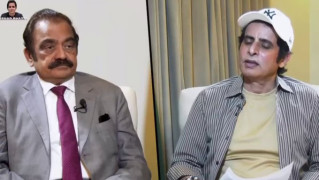asifksa
MPA (400+ posts)
- Asad Umar: Actually the need for sound budgeting becomes even more important given the extremely fragile fiscal situation Pakistan faces. We have now seen a pattern emerge in the last few years where the budget and the actual performance have huge gaps. As a result, in a desperate bid to keep the fiscal deficit from going completely out of control, the financial managers are left with no choice but to keep cutting the development expenditure as the year proceeds.
“We simply have no means to repay the previous loans”
— Asad Umar, former business administrator turned PTI leader
How important is the need for sound budgeting in Pakistan?
Consequently, development expenditures have been cut to drastically low levels and the investments desperately needed to bring growth back to the economy are not taking place and the economy is mired in stagflation.
The cost of running innumerable ministries and civil administration is high. Do you think such expenditures are justified?
There are five areas that need to be addressed. One is the massive bloat in the government that needs to be reduced by a serious reform of the ministries and departments, both reducing the number by merging them and eliminating waste in the expenditure that they incur. Secondly, the massive losses being incurred by the public sector enterprises need to be stemmed by placing them in the hands of professional boards and management who are empowered and accountable. Third, we need to rationalise the security related expenditure by working to reduce the threat environment being faced by the country, both internally and externally. Fourth, eliminating non-targeted subsidies that end up doling out billions to people who are relatively well off. Fifth, by reducing massive borrowing that the government has been doing from the banking system we would bring down inflation which will allow the central bank to reduce interest rates, which will save a huge amount of debt servicing cost.
Your comment on the current spending on development —education, health, poverty etc?
Pakistan should be spending at least four percent on education, two percent on health and one percent on direct poverty alleviation measures. Our current spending in these areas is not even half of this level.
Is it the right approach to use foreign assistance for budgetary support?
You do not need to be an economist to understand that if you are taking a loan and consuming it without creating an asset which will generate revenue, you will be in trouble. Unfortunately, because we are unwilling to tax the powerful vested interests and foreign investment has almost dried up while we continue to run huge fiscal and trade imbalances, there is no recourse but for the government to continue to borrow heavily from both within and outside the country. We already know that it is only a question of time before the government goes back to IMF for a new programme because we simply have no means to repay the previous loans whose repayment has started without resorting to new loans, since we are unwilling to take the tough reform decisions which are required.
Do you think Pakistan should prioritise physical and human infrastructure to record high growth rates?
Investment in physical and human infrastructure is a necessity for the economy to achieve sustained high growth rates. There is no trade-off between these investments and growth. Research has shown that there is a ‘crowding in’ effect of public investment which is well targeted as it draws in increased private investment also. The trade-off could be between making these investments and fiscal prudence. However, with the measures that I have pointed out above, there can be significant fiscal space created for these essential investments. In addition, we can use innovative structures to build public-private partnerships for facilitating private sector investment, particularly for investment in physical infrastructure. For this we will have to develop the debt capital markets as well as create a specialised infrastructure financing institution to support private sector investment in this area. This would release the pressure on the annual development budgets allowing those to be targeted in sectors where private investment cannot come in.
Can you briefly suggest solutions for taxation and energy crisis in Pakistan?
We need to adopt a policy of taxation regardless of source of income. We cannot run a modern country with large parts of the economy and powerful vested interests being outside the purview of the tax net. We need an across the board tax reform program which brings all segments of the economy into a fair and equitable tax net. At the same time we have to revamp the tax collection machinery and create processes which minimise discretion and the hardship that honest tax payers face at the hands of the tax collection machinery. The way to resolve the circular debt issue is reducing the cost of power generation by revamping the existing capacity and changing the fuel mix to coal instead of furnace oil, control the rampant corruption and theft — and recover the dues from the defaulters of which a major portion is from government entities. Instead of taking all these necessary steps the government keeps passing on the burden to the consumers and blames it on international prices of oil which is simply false. Even the price increases, a total of 87 percent since this government came to power, have been insufficient to make up for all the burden of wrong fuel choice, antiquated and low efficiency generation and distribution system and corruption, and as a result we still see hundreds of billions of circular debt piling up every year.
How do you look at the provincial budgets after the 18th Amendment?
The role of the provincial governments in the overall governance of the country and its fiscal balance has substantially increased after the 18th amendment and the latest NFC award. While both of these moved powers and resources to the provinces from the centre, which by itself was a good step, there is very little responsibility particularly in fiscal terms which has been assigned to the provinces. As a result, we have seen that the provincial revenue generation measures have been very weak and very little in terms of additional revenue generated by the provinces. There is a dire need for the provinces to take measures in important areas like collecting tax from large agriculture holdings and property taxes.
— Alefia T. Hussain - http://jang.com.pk/thenews/may2012-weekly/nos-27-05-2012/spr.htm
Last edited by a moderator:



































